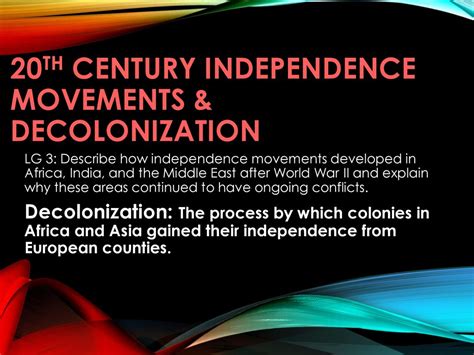The 20th century was a period of significant decolonization and independence movements around the world. As European powers began to weaken after World War II, colonies around the world began to demand their independence. This led to a wave of decolonization that transformed the political landscape of the world.

Causes of Decolonization
There were a number of factors that contributed to the decolonization movements of the 20th century. These included:
- The rise of nationalism: After World War II, there was a growing sense of nationalism in many colonies. This was fueled by a desire for self-determination and a rejection of foreign rule.
- The weakening of European powers: The European powers were weakened by World War II, both economically and politically. This made it more difficult for them to maintain control over their colonies.
- The Cold War: The Cold War between the United States and the Soviet Union also played a role in decolonization. Both superpowers were eager to gain influence in the developing world and they often supported independence movements in order to do so.
Major Decolonization Movements
Some of the most significant decolonization movements of the 20th century include:
- The Indian independence movement: India gained independence from Britain in 1947 after a long and peaceful struggle led by Mahatma Gandhi.
- The Chinese Communist Revolution: The Chinese Communist Party led a successful revolution against the Kuomintang government in 1949, establishing the People’s Republic of China.
- The African independence movements: A number of African countries gained independence from European powers in the 1950s and 1960s, including Ghana, Nigeria, and Kenya.
- The Latin American independence movements: A number of Latin American countries gained independence from Spain and Portugal in the 19th century, but many of these countries did not achieve full independence until the 20th century.
Impact of Decolonization
The decolonization movements of the 20th century had a profound impact on the world. These movements led to the creation of new nations, the end of colonialism, and the emergence of a more diverse and equitable world order.
Challenges of Decolonization
The decolonization movements of the 20th century also faced a number of challenges. These included:
- Economic challenges: Many newly independent countries faced economic challenges, such as poverty, unemployment, and inflation.
- Political challenges: Many newly independent countries also faced political challenges, such as instability, corruption, and ethnic conflict.
- Social challenges: Many newly independent countries also faced social challenges, such as discrimination, inequality, and poverty.
Conclusion
The decolonization movements of the 20th century were a major watershed moment in history. These movements led to the creation of new nations, the end of colonialism, and the emergence of a more diverse and equitable world order. However, these movements also faced a number of challenges. Many newly independent countries continue to face economic, political, and social challenges today.
The following table lists some of the most notable decolonization movements of the 20th century:
| Year | Country | Independence from |
|---|---|---|
| 1947 | India | Britain |
| 1949 | China | Kuomintang government |
| 1957 | Ghana | Britain |
| 1960 | Nigeria | Britain |
| 1963 | Kenya | Britain |
| 1975 | Angola | Portugal |
| 1980 | Zimbabwe | Britain |
| 1990 | Namibia | South Africa |
| 1994 | South Africa | Apartheid system |
The decolonization movements of the 20th century had a significant impact on the global economy. These movements led to the creation of new markets, the expansion of trade, and the emergence of new economic powers.
New Markets
The decolonization movements of the 20th century created new markets for goods and services. This was because newly independent countries were eager to develop their economies and improve the living standards of their people. This led to an increase in demand for a wide range of products, from consumer goods to industrial machinery.
Expansion of Trade
The decolonization movements of the 20th century also led to the expansion of trade. This was because newly independent countries were eager to trade with each other and with other countries around the world. This led to an increase in the flow of goods and services between different regions of the world.
New Economic Powers
The decolonization movements of the 20th century also led to the emergence of new economic powers. This was because newly independent countries were able to develop their own economies and become major players in the global economy. This led to a shift in the balance of economic power from the developed countries to the developing countries.
The decolonization movements of the 20th century also faced a number of challenges. These included:
Economic Challenges
Many newly independent countries faced economic challenges, such as poverty, unemployment, and inflation. This was because these countries often lacked the infrastructure and resources needed to develop their economies.
Political Challenges
Many newly independent countries also faced political challenges, such as instability, corruption, and ethnic conflict. This was because these countries often lacked the institutions and experience needed to govern themselves effectively.
Social Challenges
Many newly independent countries also faced social challenges, such as discrimination, inequality, and poverty. This was because these countries often had deep-rooted social problems that were difficult to overcome.
Conclusion
The decolonization movements of the 20th century were a major watershed moment in history. These movements led to the creation of new nations, the end of colonialism, and the emergence of a more diverse and equitable world order. However, these movements also faced a number of challenges. Many newly independent countries continue to face economic, political, and social challenges today.
